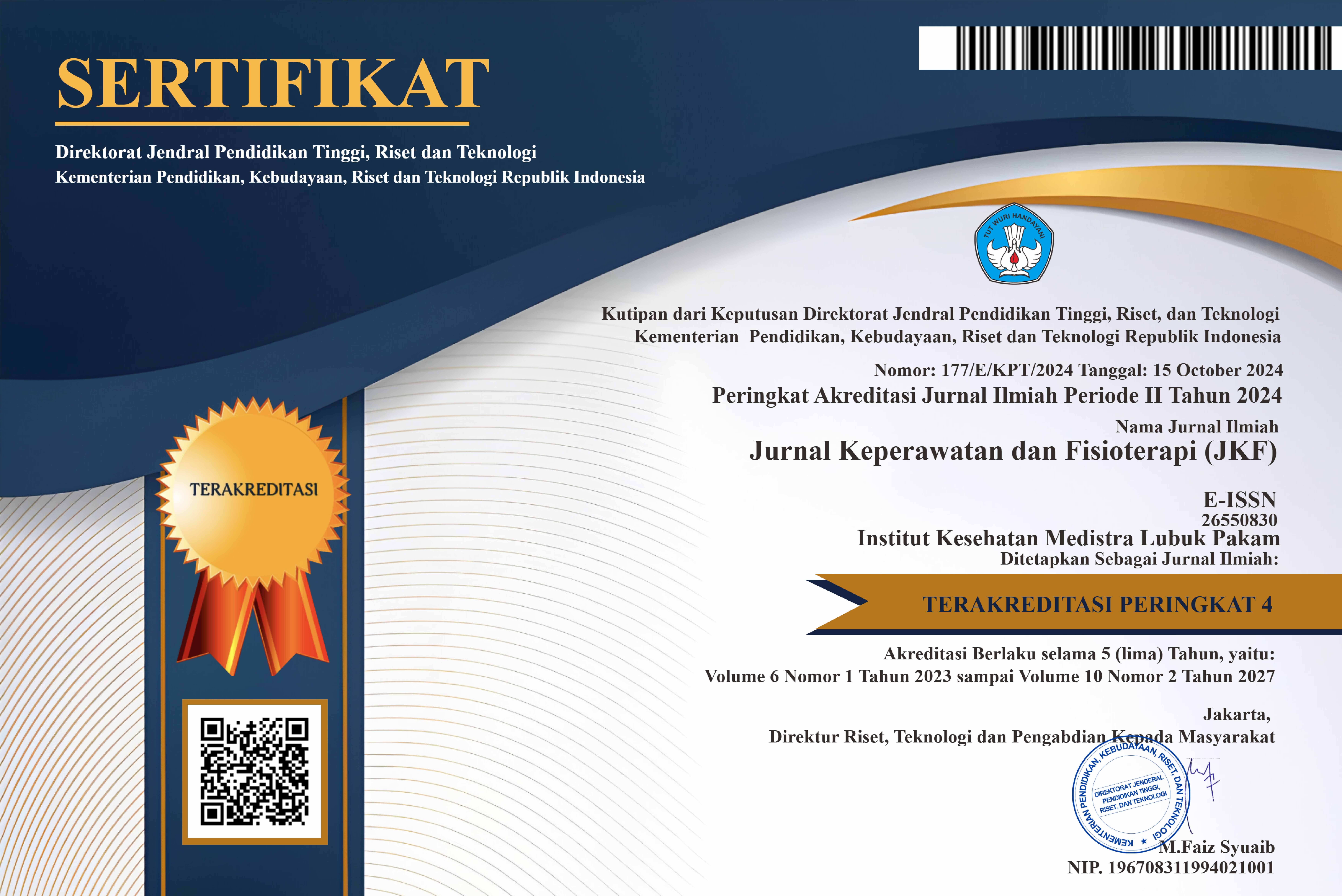Effect Of Emotional Freedom Technique On Pre Percutaneous Coronary Intervention Patients' Anxiety In Hospital
DOI:
https://doi.org/10.35451/jkf.v5i2.1259Keywords:
Emotional Freedom Technique (EFT); Percutaneous Coronary Intervention (PCI); AnxietyAbstract
Coronary heart disease is a degenerative disease. One of the techniques that can open blood vessels and return blood through the coronary arteries is Percutaneous Coronary Intervention (PCI). Hemodynamic conditions are one of the patient's preparations for PCI, but anxiety can respond to the cardiovascular system, one of which is a disturbance in a person's hemodynamics. Problems that often arise in pre PCI patients are anxiety.Percutaneous Coronary Intervention is one of the techniques that have been invented to open the blood vessels and return blood through the coronary arteries (PCI). PCI, also known as cardiac catheterization, is a procedure that involves inserting one or more catheters into the heart and blood arteries. The catheter is inserted through a peripheral vessel, usually femoral, then non-operatively invasive so that complications can be kept as low as possible. Percutaneous Coronary Intervention (PCI) can cause complications in the form of myocardial infarction, stroke, arrhythmia and death. This causes a person to feel himself threatened, someone feels himself threatened can cause the effect of Anxiety (anxiety). The problem that often arises in pre PCI patients is anxiety. One of the efforts to overcome anxiety is the Emotional Freedom Technique (EFT). This type of research is a quantitative study using a quasi-experimental design with a pretest-posttest with a control group, namely by conducting a pretest in both groups and followed by an intervention in the experimental group and then conducting a posttest in both groups, with a sample of 34 respondents. The results showed that the effect of EFT on the anxiety of pre PCI patients in the intervention group with p-value = 0.000, while in the control group with p-value = 0.650. Furthermore, it is hoped that clients who will undergo PCI will not be hindered from doing PCI because the client has been given Emotional Freedom Technique (EFT) therapy.
Downloads
References
Annisa dan Ifdil. 2016. Konsep Kecemasan (Anxiety) Pada Lanjut Usia (Lansia). http://ejournal.unp.ac.id/index.php/konselor/article/view/6480.
Bilqis, Yaunin, & Darwin. 2018. Hubungan Tingkat Ansietas dengan Infeksi Saluran Pernafasan Akut pada Mahasiswa Kedokteran Universitas Andalas Angkatan 2015.
Chrisnawati dan Aldino. 2019. Aplikasi Pengukuran Tingkat Kecemasan Berdasarkan Skala Hars Berbasis Android. dalam http://ejournal.bsi.ac.id/ejurnal/index.php/jtk.
Isnadiya, Aola & Taufiq. 2019. Pengaruh Emotional Freedom Technique (Eft) Terhadap Tingkat Kecemasan Pasien Pre Percutaneous Coronary Intervention (PCI) Di SMC Rs Telogorejo. Jurnal Ilmu Keperawatan Medikal Bedah.
Lemone, P., Karen, M & Bauldoff, G. 2016. Buku ajar keperawtaan medikal bedah. Alih bahasa Ayu Linda. Jakarta: EGC.
Sahlia, Muntiyah & Hakam. 2018. Pengaruh Terapi emotional freedom technique terhadap depresi pada klien hipertensi. e-Jurnal Pustaka Kesehatan Vol.6 (No3).
Saputra. 2015. Terapi emotional freedom terapi pada pasien hipertensi. https://Bab-ii-tinjauan pustaka-a-terapi-emotional freedom technique-pada-pasien-hipertensi.
Sari, Suryani, & Emiliawati. 2014. Emotional Freedom Techniques dan Tingkat Kecemasan Pasien yang akan Menjalani Percutaneous Coronary Intervention. Jurnal keperawatan Padjadjaran.
Sastroasmoro, Sudigdo. 2017. Dasar – Dasar Metodologi Penelitian Klinis Edisi 5. Jakarta: Sagung Seto.
Shari, dan Weni. 2014. Emotional Freedom Techniques dan Tingkat Kecemasan Pasien yang akan Menjalani Percutaneous Coronary Intervention. Jurnal Keperawatan Padjadjaran.
Downloads
Published
Issue
Section
License
Copyright (c) 2023 Arfah May Syara

This work is licensed under a Creative Commons Attribution 4.0 International License.
Copyright in each article is the property of the Author.


























